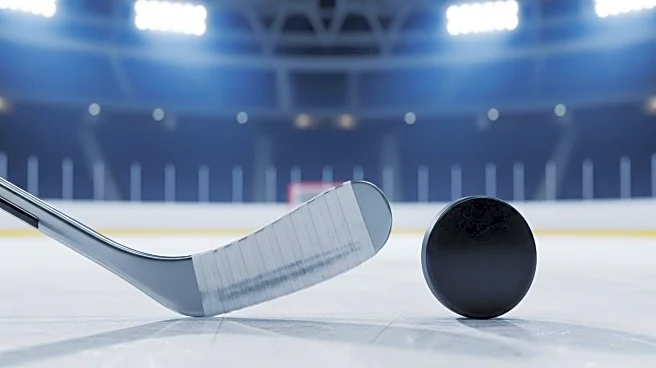What's Happening?
Alex Ovechkin, captain of the Washington Capitals, has dismissed rumors about his potential retirement. Despite being 39 years old, Ovechkin continues to perform at a high level, finishing the 2024-25 NHL season with 44 goals and 73 points, tying for third in goals across the league. Speculation about his retirement began after a Capitals marketing email suggested the next season might be his last, and his wife mentioned the possibility of returning to Russia after his contract ends in 2026. Ovechkin has labeled these rumors as 'pure nonsense,' stating he has not made any decisions about his future and intends to keep playing. He expressed a desire to inspire young athletes and pass on his experience, emphasizing that he is not currently considering retirement.
Why It's Important?
Ovechkin's continued presence in the NHL is significant for both the Washington Capitals and the league. As one of the most prolific scorers in NHL history, his performance impacts the Capitals' competitiveness and fan engagement. His decision to keep playing could influence team strategies and marketing efforts, as well as inspire younger players. The denial of retirement rumors also stabilizes the Capitals' roster planning, allowing them to focus on building around Ovechkin's leadership and skills. His ongoing career contributes to the NHL's narrative of veteran players defying age-related expectations, which can enhance the league's appeal to diverse audiences.
What's Next?
Ovechkin's current contract with the Capitals runs through the 2025-26 season, suggesting he will continue to play at least until then. The Capitals are likely to rely on his leadership and scoring ability in the upcoming season, aiming for a stronger playoff performance. Ovechkin's decision to remain active may also influence other veteran players considering retirement, potentially leading to a trend of extended careers in the NHL. Fans and analysts will be watching his performance closely, especially as he approaches further milestones in his career.
Beyond the Headlines
Ovechkin's decision to continue playing highlights the broader issue of athlete longevity and the evolving nature of sports careers. As training methods and healthcare improve, athletes are increasingly able to extend their careers, challenging traditional retirement norms. This shift may lead to changes in how teams manage aging players and how contracts are structured. Additionally, Ovechkin's influence on young athletes underscores the role of veteran players in shaping the future of sports, both through mentorship and by setting performance benchmarks.









